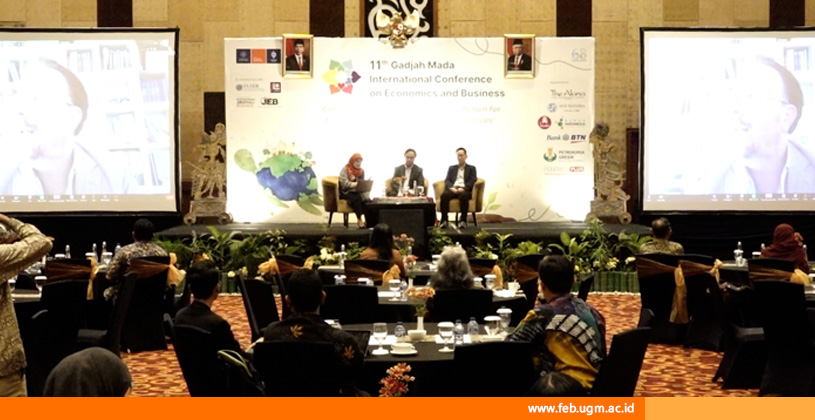IFRS Enforcement, Handling Greenwashing, and Blockchain as a Driver of Social Entrepreneurship
- Details
- Written by Hayfaza
- Category: News
- Hits: 469

In a sequence with The 11th Gadjah Mada International Conference on Economics and Business (GAMAICEB) 2023, the Faculty of Economics and Business, Universitas Gadjah Mada (FEB UGM) held a second plenary session at the Alana Hotel Yogyakarta. This plenary session (26/09) was attended by GAMAICEB participants and presenters. The plenary session invited three speakers with in-depth expertise in their respective topics. This third resource person includes Prof. Holger Daske (Professor at the University of Mannheim), Dr. Frendy (Associate Professor at Nagoya University of Commerce and Business), and Dr. Yanto Chandra (Associate Professor at City University of Hong Kong). The third theme presented is in line with this year's GAMAICEB theme, "Collaborative Research and Policy Action to Achieve Sustainable Development Goals''. The plenary session on the second day of GAMAICEB is in line with SDGs Goal 8, decent work and economic growth and Goal 16, peace, justice, strong institutions.
Prof. Holger Daske's Session: Principles-Based IFRS Enforcement
The plenary session began with Prof. Holger Daske's presentation regarding the application of the principles-based International Financial Accounting Standard IFRS in financial reporting. Prof. Daske explained that strong law enforcement or "strong law enforcement". In principle, IFRS involves "decisions" if handled with broad principles and using the phrase "substance over form". In measurement, this consideration uses a fair value estimate. Implementation of the decision will also result in an accepted accounting solution under IFRS, he added. Prof. Daske continued his presentation regarding the challenges in enforcing IFRS as well as the role of stakeholders and many parties ranging from institutions, courts, political forces, and audit firms to literature in enforcement. He also added that the discovery of an error had minor consequences for the company and capital markets but had a fatal impact on the individual's career (accountant).
Dr. Frendy's Session: Greenwashing in the Context of Corporate Reporting
Dr. Frendy continued the plenary session with his presentation on greenwashing from a regulatory and research perspective. Dr Frendy started his presentation by explaining that behind the increasing trend of Environment, Social, and Governance (ESG) in financial reporting, there is an increase in misleading communication in reporting on topics surrounding Greenwashing globally. Facing this, IFRS strengthens reporting principles and adapts to regional regulations, for example, the Sustainable Finance Disclosure Regulation (SFDR) and mandatory external guarantees adopted by the European Union. In the context of another country, namely Japan, Dr. Frendy explained that the Japanese government is encouraging ESG market expansion and corporate governance reform. However, a warning, namely accusations of greenwashing, needs to be taken into account: False Positive Risk. Dr. Frendy then concluded his presentation with a solution based on PADERC research: the use of AI, namely natural language processing (NLP), in detecting potential greenwashing in companies with significant emissions, remembering to implement the regulations adopted in the relevant region.
Dr. Yanto Chandra's Session: Blockchain as a New Driver for Social Entrepreneurship
Dr. Yanto continued the plenary session with a presentation on blockchain technology to ensure the social impact and benefits of social entrepreneurship. Dr. Yanto started his presentation with an abstract explanation: external empowerment in entrepreneurship, which he tried to formulate using blockchain as a solution so that businesses can contribute to sustainability. Dr. Yanto continued his presentation by introducing the principles of social entrepreneurship, which utilizes the best value from three dimensions: market, government and society, which integrates value creation from the social side and value capture from the economic side. Furthermore, the hot discussion about social entrepreneurship has encountered challenges ranging from employee performance, which is often not yet optimal, profitability, which is less efficient because profits are reinvested for empowerment, unclear legitimacy, too strong an emphasis on theory, and several other challenges.
Facing various social entrepreneurship problems and challenges, Dr. Yanto proposed the application of blockchain, starting from the use of decentralized Web 3.0 in information management, transactions, and protection of data and transactions. He proposed blockchain as an external governance and empowerment tool to trigger entrepreneurial transformation. Dr. Yanto then explained examples of company studies, starting from Quartier Storm, a local electricity company in Switzerland that uses blockchain, BlocRice: the use of blockchain for organic farmers to facilitate payments, connect with buyers without middlemen and predict the market. In essence, Dr. Yanto concluded that blockchain technology, which is based on the implementation of good research, has the potential to empower social entrepreneurship in the world.
Reportage: Hayfaza Nayottama




